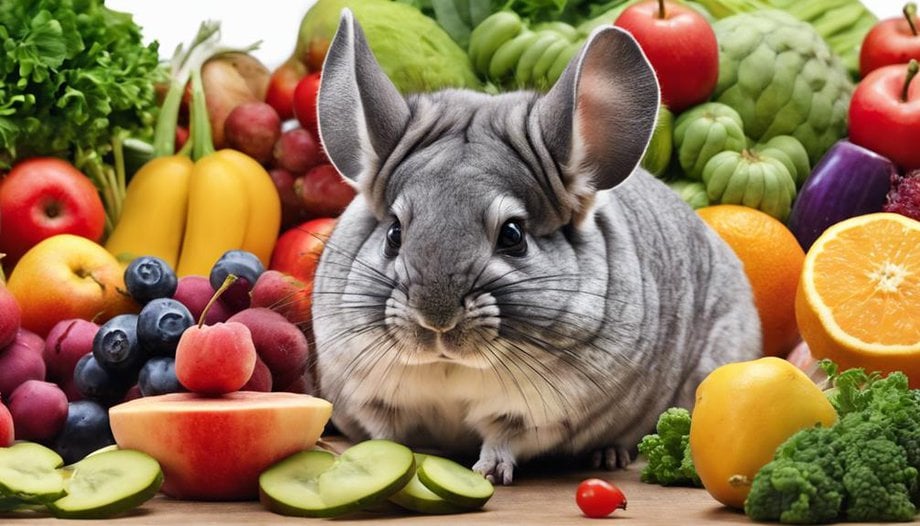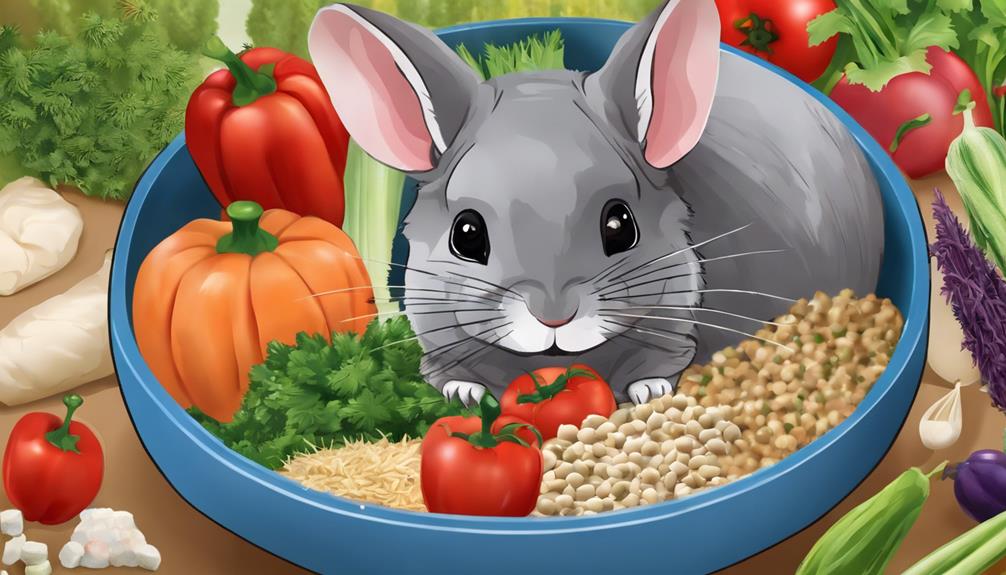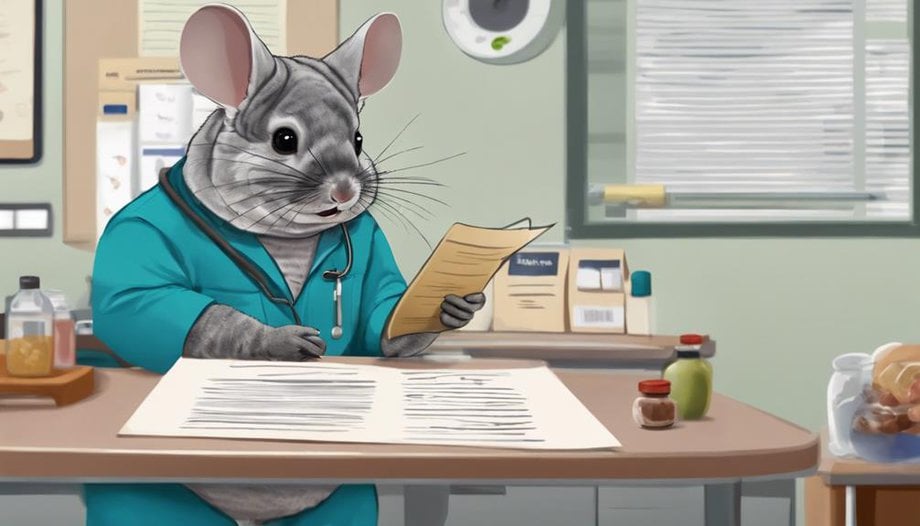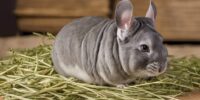What to Do If Your Chinchilla Has Dietary Restrictions

Managing chinchilla dietary restrictions is essential for their health and happiness. Chinchillas have sensitive digestive systems and specific dietary needs. It is crucial to provide them with a balanced diet that includes high-quality hay, pellets, fresh water, and occasional treats. Avoid feeding them foods high in fat, sugar, or moisture, as these can cause digestive issues. Monitor your chinchilla's weight and adjust their diet accordingly. Consulting with a veterinarian specializing in exotic pets can provide valuable guidance on managing your chinchilla's dietary restrictions.
Taking care of your chinchilla's dietary needs will help ensure they live a long and healthy life. By providing a proper diet and monitoring their food intake, you can help prevent health issues and keep your chinchilla happy and active. Remember to introduce new foods gradually and observe how your chinchilla reacts to them. With proper care and attention to their dietary restrictions, you can help your chinchilla thrive and enjoy a fulfilling life.
Common Dietary Restrictions in Chinchillas
When caring for chinchillas, it's important to be aware of their common dietary restrictions to guarantee their health and well-being. Identifying triggers that can upset their delicate digestive system is important. Chinchillas have sensitive stomachs and are prone to gastrointestinal issues if not fed a proper diet.
Special considerations must be made when it comes to their food. For instance, chinchillas can't digest high-fat foods well. It's essential to avoid giving them nuts, seeds, or high-sugar treats as these can lead to obesity and other health problems. Additionally, chinchillas require a high-fiber diet to maintain proper digestion. Hay should make up the majority of their diet, along with limited pellets specifically formulated for chinchillas.
Understanding these dietary restrictions and making appropriate adjustments will guarantee your chinchilla stays healthy and happy. By providing a well-balanced diet and avoiding foods that can cause harm, you're taking proactive steps to promote the well-being of your furry friend.
Identifying Allergies and Sensitivities
To guarantee your chinchilla's peak health, it's imperative to be mindful of any potential allergies and sensitivities they may have towards certain foods. Identifying intolerances and managing allergies in your chinchilla requires careful observation and attention to detail. Here are some steps to help you navigate this process:
- Observation: Watch your chinchilla closely after introducing a new food to see if there are any adverse reactions such as changes in behavior, appetite, or digestive issues.
- Food Diary: Keep a detailed record of what your chinchilla eats daily and any reactions or symptoms they exhibit. This can help you pinpoint potential triggers.
- Elimination Diet: If you suspect a specific food is causing issues, try removing it from their diet for a period and observe if there's an improvement in their health.
- Consult a Vet: If you notice persistent symptoms or are unsure about managing your chinchilla's allergies, seek guidance from a veterinarian specializing in exotic pets to ensure proper care and treatment.
Safe Foods for Chinchillas With Restrictions

For chinchillas with dietary restrictions, ensuring their health and well-being involves providing safe and suitable foods tailored to their specific needs. When catering to chinchillas with dietary limitations, focusing on nutritional supplements and treat alternatives that can meet their requirements without causing harm is vital.
Nutritional supplements play an important role in ensuring that your chinchilla receives all the necessary vitamins and minerals it may be missing due to dietary restrictions. Look for supplements specifically formulated for chinchillas to support their overall health.
Additionally, treat alternatives can be a great way to provide your chinchilla with variety and enjoyment while still adhering to their dietary restrictions. Opt for healthy treat options that are safe for your chinchilla to consume, such as dried fruits or specially formulated chinchilla treats.
Avoiding Harmful Ingredients
When caring for your chinchilla, it's important to be mindful of the ingredients in their food. Make safe choices and always read labels carefully to guarantee harmful ingredients are avoided.
Safe Food Choices
Choosing safe food choices for your chinchilla involves being mindful of harmful ingredients that can negatively impact their health. Here are some tips to help you make the best decisions for your furry friend:
- Avoid Sugary Treats: Steer clear of sugary snacks as they can lead to dental issues and obesity.
- Say No to Unprocessed Foods: Opt for natural, unprocessed foods to guarantee your chinchilla gets the nutrients they need.
- Watch Out for Artificial Additives: Check labels for artificial colors, flavors, and preservatives that may harm your pet.
- Limit Fatty Foods: High-fat treats can cause digestive problems, so it's best to offer them sparingly.
Reading Labels Carefully
Carefully examining labels is important to guarantee that harmful ingredients are avoided when selecting food for your chinchilla. Always look out for label warnings that may indicate ingredients unsuitable for your pet.
Ingredient analysis is essential; make sure the food is free from items like high-sugar fruits, nuts, seeds, or artificial additives that could harm your chinchilla's delicate digestive system.
By reading labels attentively, you show your dedication to providing the best care for your furry friend. Remember, your chinchilla's well-being is in your hands, so take the time to make informed choices.
Your efforts in understanding and avoiding harmful ingredients will contribute greatly to your chinchilla's health and happiness.
Consulting With a Vet

When it comes to your chinchilla's diet, consulting with a vet is important. Your vet's expertise will help you formulate a clear dietary plan tailored to your chinchilla's specific needs.
Regular check-ups will make certain that your furry friend stays healthy and happy.
Vet Expertise Essential
For prime care of your chinchilla's dietary needs, seeking guidance from a veterinary expert is essential. Your vet can provide tailored advice for your chinchilla's specific dietary restrictions, ensuring their health and well-being. Here are some key reasons why consulting with a vet is vital:
- Professional Assessment: Vets can evaluate your chinchilla's overall health and create a customized dietary plan.
- Nutritional Supplements: Vets can recommend safe and appropriate nutritional supplements to meet your chinchilla's specific needs.
- Alternative Treats: Your vet can suggest alternative treats that are safe and suitable for your chinchilla's dietary restrictions.
- Monitoring and Follow-Up: Vets can monitor your chinchilla's progress and make any necessary adjustments to their diet.
Clear Dietary Plan
To ensure top health for your chinchilla, consulting with a veterinary expert is essential for creating a clear dietary plan tailored to their specific needs. Meal planning and ensuring nutritional balance are key components in maintaining your chinchilla's well-being. Below is a simple guide to help you understand the importance of a structured diet plan for your furry friend:
| Meal Planning | Nutritional Balance |
|---|---|
| Consistent feeding schedule | Balanced mix of hay, pellets, and fresh vegetables |
| Limited treats to avoid health issues | Access to fresh, clean water at all times |
| Adjustments based on age and health status | Monitoring weight and overall health regularly |
Following this structured dietary plan will help promote a healthy and happy life for your beloved chinchilla.
Regular Check-Ups Necessary
Shifting from ensuring a clear dietary plan for your chinchilla, remember that regular check-ups with a vet are imperative to maintaining their overall health and well-being. Regular monitoring and consultations with a qualified veterinarian will aid in addressing any emerging health concerns promptly. Here are four essential reasons why these check-ups are vital:
- Early Detection: Vets can identify potential health issues before they escalate.
- Professional Advice: Receive expert guidance on dietary adjustments to meet your chinchilla's specific needs.
- Vaccination Schedule: Ensure your chinchilla is up to date with necessary vaccinations for the best health.
- Tailored Care: Vets can provide personalized care plans based on your chinchilla's individual health requirements.
Monitoring Weight and Health
Regularly monitoring your chinchilla's weight and overall health is important for ensuring their well-being and longevity. By keeping a close eye on your chinchilla's weight and health concerns, you can effectively track their progress and address any issues promptly.
To monitor your chinchilla's weight, one must use a reliable scale specifically designed for small animals. Weigh your chinchilla regularly and keep a record of any fluctuations. Sudden weight loss or gain can indicate underlying health problems that need attention. In addition to weight, observe your chinchilla's overall health, including their fur quality, activity level, and appetite.
If you notice any concerning changes, such as lethargy, changes in eating habits, or irregularities in their fur, consult your veterinarian immediately. Early detection of health issues can lead to better outcomes for your chinchilla. Remember, your chinchilla's well-being is in your hands, so stay vigilant and proactive in monitoring their weight and health regularly.
Transitioning to New Diet
When introducing your chinchilla to a new diet, make sure the change is gradual to prevent any digestive upsets. Abrupt alterations can lead to stomach issues and stress for your little friend.
Here are some tips to help you shift your chinchilla to a new diet smoothly:
- Gradual Change: Slowly introduce small amounts of the new food while reducing the old one over a period of 7-10 days.
- Observe Closely: Monitor your chinchilla's behavior, stool consistency, and overall health during the shift phase.
- Consult a Vet: If you have concerns or if your chinchilla is showing signs of distress, seek advice from a veterinarian experienced with small animals.
- Consider Nutritional Supplements: To make sure your chinchilla receives all essential nutrients during the shift, discuss with your vet the need for any additional supplements.
Frequently Asked Questions
Can Chinchillas Have Food Intolerances or Sensitivities, or Is It Just Allergies That They Can Develop?
When it comes to chinchillas, food intolerances can cause tummy troubles, just like allergies. Pay attention to symptoms and consider elimination diets. They can help pinpoint triggers and keep your fluffy friend feeling their best.
Are There Any Specific Brands or Types of Chinchilla Food That Are Better for Chinchillas With Dietary Restrictions?
To cater to chinchillas with dietary restrictions, consider offering specialized brands like Oxbow or Mazuri. These are top choices for special diets. Providing these options guarantees your chinchilla receives the necessary nutrition while accommodating their unique needs.
How Can I Tell if My Chinchilla Is Not Tolerating a Certain Food Well, Even if It's Not Causing an Allergic Reaction?
If your chinchilla shows signs of intolerance to certain foods, observe changes in behavior, digestion, or stool. Prioritize your chinchilla's wellbeing by adjusting food choices to accommodate dietary restrictions and secure their health and comfort.
Are There Any Supplements or Vitamins That Chinchillas With Dietary Restrictions May Need to Ensure They Are Getting All the Nutrients They Need?
To guarantee your chinchilla's health with dietary restrictions, consider nutritional supplements and vitamins. These can provide essential nutrients. Consult a vet for precise guidance on what your furry friend needs for peak well-being.
Can Chinchillas With Dietary Restrictions Still Have Treats, and if So, What Should I Look for in a Safe Treat Option?
When choosing treats for chinchillas with dietary restrictions, opt for safe options with natural ingredients. Look for treats that promote health benefits like dental health or digestion support. Your chinchilla will appreciate these tasty and beneficial snacks.











